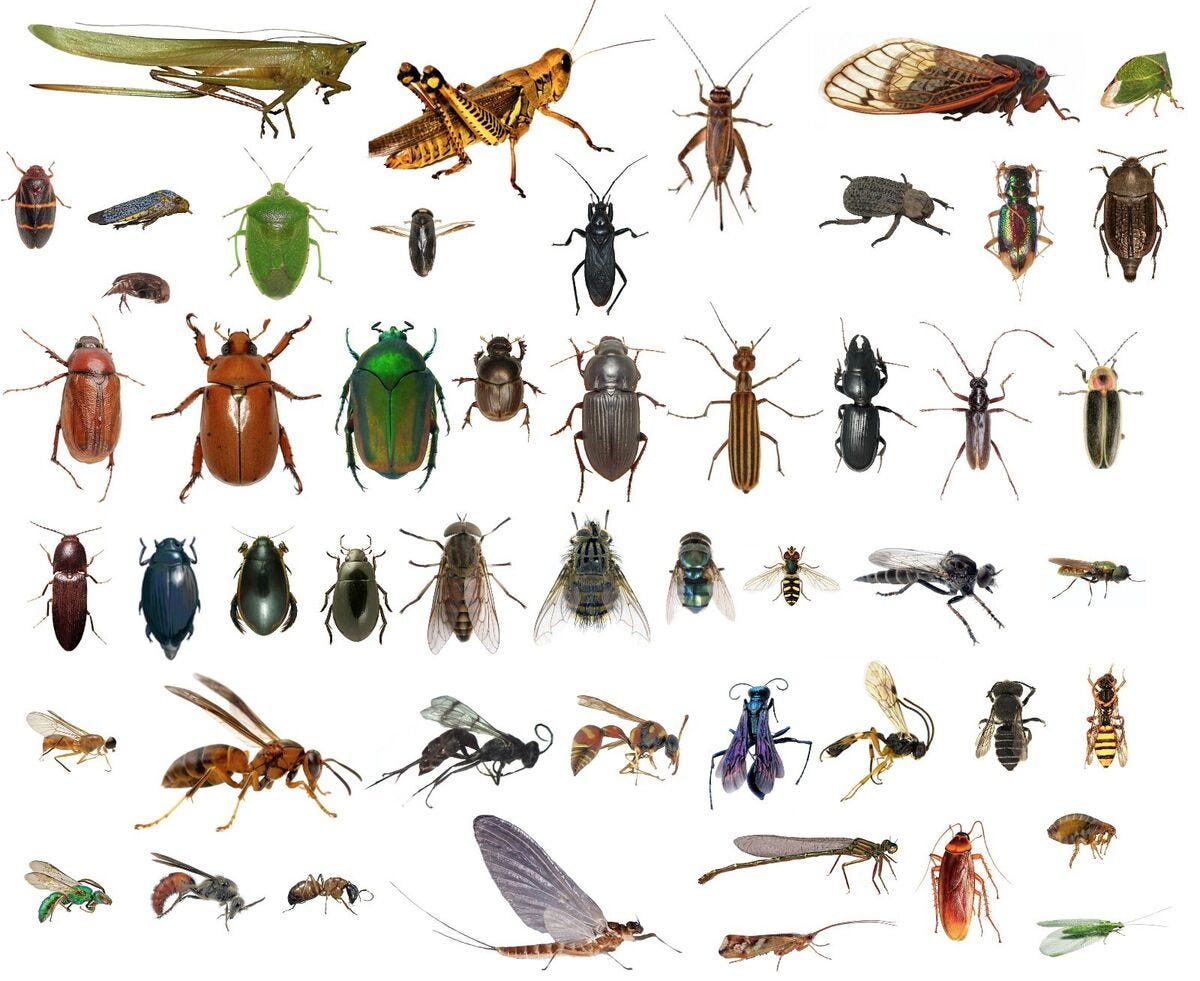Bugs
The most compelling objection to animal rights, to my mind, has long been… bugs. Bugs are animals. Every human being directly kills bugs just by walking – and indirectly kills bugs by renting and buying constructed housing. Yet I’ve never heard even a strict vegan express a word of moral condemnation for this mass animal killing.
So what? I’ve previous defended what I call the Argument from Conscience. The gist of it:
1. If even morally scrupulous advocates of view X don’t live in accordance with X, the best explanation is that they don’t really believe X.
2. If even the dedicated advocates of X don’t really believe X, X is probably false.
By this logic: If even morally scrupulous animal rights activists don’t sincerely believe that killing bugs is wrong, it’s probably not wrong. And once you proverbially throw bugs under the bus, why not other pests like mice and rats? And once you abandon mammalian pests, why not cows and pigs?
But perhaps I’m getting ahead of myself. What exactly do leading animal rights activists actually say about bugs? Let’s start with PETA, which endorses the following general principles:
PETA believes that animals have rights and deserve to have their best interests taken into consideration, regardless of whether they are useful to humans. Like you, they are capable of suffering and have an interest in leading their own lives.
The very heart of all of PETA’s actions is the idea that it is the right of all beings–human and nonhuman alike–to be free from harm.
Now here’s PETA on bugs:
All animals have feelings and have a right to live free from unnecessary suffering–regardless of whether they are considered “pests” or “ugly.”
As with our dealings with our fellow humans, the determination of when lethal defense against insects and animals is acceptable must be judged on a case-by-case basis, taking into account the level of the threat and the alternatives that are available. As Albert Schweitzer once said “Each of us must live daily from judgment to judgment, deciding each case as it arises as wisely and mercifully as we can.”
A bizarre juxtaposition. No one would say that humans have a “right to live free from unnecessary suffering,” then immediately talk about killing them on a “case-by-case basis.” And if someone killed hundreds of humans with his car on a cross-country trip, no one would accept the excuse, “It was necessary to cross the country.” If your only mode of transportation kills innocent human beings, you’re obliged to stay put. General principles notwithstanding, PETA clearly smuggles in the common-sense intuition that human lives are more morally important than insect lives. Indeed, it smuggles in the assumption that human convenience is more morally important than insects’ very lives.
To be fair, I’ve heard many animal activists hold PETA in low regard. Here’s what the Animal Rights FAQ tells us about bugs:
Singer quotes three criteria for deciding if an organism has the capacity to suffer from pain: 1) there are behavioral indications, 2) there is an appropriate nervous system, and 3) there is an evolutionary usefulness for the experience of pain. These criteria seem to satisfied for insects, if only in a primitive way.
Now we are equipped to tackle the issue of insect rights. First, one might argue that the issue is not so compelling as for other animals because industries are not built around the exploitation of insects. But this is untrue; large industries are built around honey production, silk production, and cochineal/carmine production, and, of course, mass insect death results from our use of insecticides. Even if the argument were true, it should not prevent us from attempting to be consistent in the application of our principles to all animals…
My Argument from Conscience, to repeat, objects: “But no one – even the author of this FAQ – does this. Which strongly suggests even he finds his own position unconvincing.” But to his credit, the FAQ author discloses these complications:
Insects are a part of the Animal Kingdom and some special arguments would be required to exclude them from the general AR argument.
Some would draw a line at some level of complexity of the nervous system, e.g., only animals capable of operant conditioning need be enfranchised. Others may quarrel with this line and place it elsewhere. Some may postulate a scale of life with an ascending capacity to feel pain and suffer. They might also mark a cut-off on the scale, below which rights are not actively asserted. Is the cut-off above insects and the lower invertebrates? Or should there be no cut-off? This is one of the issues still being actively debated in the AR community.
People who strive to live without cruelty will attempt to push the line back as far as possible, giving the benefit of the doubt where there is doubt.
The overarching problem with these “exclusion” arguments: They try to justify a massive difference in treatment with a totally debatable difference in capacity for pain. It’s easy to show that some creatures are much smarter than others; but how on earth could we ever convincingly show that some feel much less pain than others?
This is especially pressing given the FAQ’s closing proviso: If there’s a real possibility that killing bugs is very wrong, we should refrain until we know better. And per the Argument from Conscience, since even the author of the FAQ does not refrain, there probably isn’t a real possibility that killing bugs is very wrong.
P.S. What about more academic sources? I searched Google Scholar, but found nothing on the topic. I’m open to reading suggestions in the comments.
The post appeared first on Econlib.



Hi Bryan,
Have you come across Brian Tomasik, who certainly cares about insect suffering (https://reducing-suffering.org/cost-effectiveness-comparison-for-different-ways-to-reduce-insect-suffering/)?
I think the best argument against veganism is that one can neutralise the annual suffering caused to farmed animals with a few $. I estimated 2.02 $/year (https://forum.effectivealtruism.org/posts/FzSqMzZpmHdMAft7z/founders-pledge-s-climate-change-fund-might-be-more-cost#Carbon_and_farmed_animal_welfare_footprint).